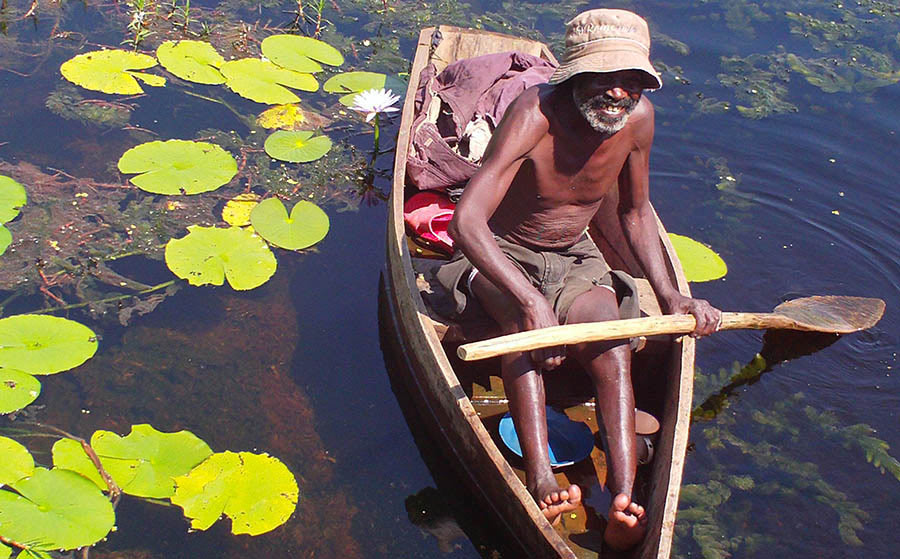
It’s the simple things that can have the biggest impact: gum boots for the rangers and a few days paid work for the ex-poachers. Equipping anti-poaching patrols in Uganda.
Uganda Wildlife Authority rangers will soon, for the first time ever, have a permanent base in the Dura sector, an area of 400km² north of Lake George in Queen Elizabeth National Park, thanks to the Uganda Conservation Foundation, the organisation I work for.

Construction workers finish the last section of brickwork for the ranger station built by UCF for UWA. Queen Elizabeth National Park
Why is UCF building ranger accommodation in Queen Elizabeth?
Away from the popular tourism areas, the Uganda Wildlife Authority is massively under resourced. Rangers cover an enormous territory – Queen Elizabeth National Park (QENP) covers an area of nearly 2000 km2 – of difficult and often inaccessible terrain. We need to house rangers in the heart of the area so they can get straight to the areas that need policing. We’ve employed a local construction company and the finished block will house four rangers and their families.
What does this mean for the poachers?
The mere presence of rangers is often enough to deter many poachers. At the end of last year, 400 poachers were reported to have voluntarily handed in spears and hunting equipment to UWA! This followed straight after a three week programme when we employed 25 ex-poachers to clear Papyrus and Hippo Grass as part of works to establish our new boat station on northern Lake George. UCF and UWA used this opportunity to sensitise the local community to our conservation aims, to the potential benefits (revenue, jobs) they can earn through tourism and of the penalties for poaching / smuggling bushmeat or live animals.

Confiscated spears, Black and White Colobus Monkey skin. UWA armoury, Mweya, Queen Elizabeth National Park
The fact is this is a very remote part of the world, where unemployment is high and traditional belief systems and ways of living dominate: you can’t just tell people to stop poaching, alternative ways of living have to be encouraged and supported.
As part of the Dura recovery project, the rangers stationed in the new accommodation will start removing snares. Snares are indiscriminate. They hurt, capture and ultimately kill all kinds of animals: feet can become trapped; wire can get tightly wrapped around an elephant’s trunk; in neighbouring Kibale Forest, 50% of chimpanzees have limbs missing because of snares.
Snare removal and anti-poaching is dangerous work and we will be relying on the cooperation of the ex-poachers to show us where snares and poachers camps are located.
How do boats help stop poaching?
Previously UWA had been helpless in controlling poachers operating by boat and smoking bushmeat along the dense and inaccessible Papyrus shorelines. Shipped through the waterways, boats link up with vehicles in the villages or public roads that cut through the Park. Disturbingly, significant amounts of live wildlife and bushmeat are smuggled out of the adjoining Virunga National Park in the Democratic Republic of Congo. Every week there are reports of Uganda being used as a smuggling route for ivory, usually for onward shipment to Asia where demand for ivory continues to dramatically increase.
The Uganda Conservation Foundation has developed a strategic network of marine ranger stations, each comprising a reclaimed shipping container, small aluminium boat, outboard engine and life jackets, manned by marine rangers trained to Royal Yachting Association standard. Now deployed across Queen Elizabeth, Murchison Falls and Lake Mburo National Parks, the impact of the Waterways project has been extraordinary.

UWA’s Chief Vet removes a wire snare from an elephant’s trunk in Murchison Falls National Park. This elephant was lucky to survive. Many animals bleed or starve to death.
Queen Elizabeth’s Chief Park Warden Tom Okello explains: “Law enforcement operations across Queen Elizabeth’s almost 2000 km² are limited due to only two vehicles being available. Vehicle maintenance and fuel costs are very high. Travel across the Kazinga Channel to patrol the other bank would usually entail driving 150 km to drop off our rangers, in full view of the poachers! Boats allow us to cross whenever and wherever we need our patrols. We are really winning against the poachers and proud to add this waterborne capacity to conserve our elephants and other animals.”

Site clearance at Kahendero was quite a big task but provided cash payment for 25 ex-poachers. Paid work is hard to find in remote parts of Uganda
What next for anti-poaching patrols in Queen Elizabeth?
We’re now focusing on fund-raising for construction of a ten man ranger post to boost permanent ranger presence in the same area. We’re nearly there and work should start soon. We’ve also submitted funding proposals for additional equipment to support the rangers: simple solutions such as protective clothing (‘gumboots’ and waterproof clothing), tents, mosquito nets and bicycles for mobile patrol units all make a big difference. Rangers are on incredibly low wages – less than £40 a month – so having the right equipment makes a massive difference to motivation levels.


























8 thoughts on “Anti-poaching: the answer’s in the gumboots!”